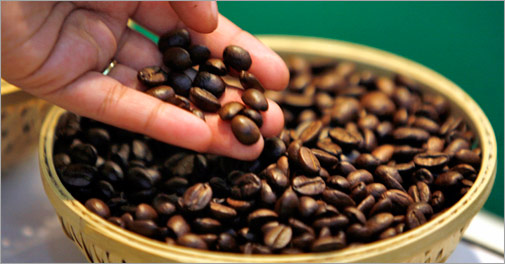
The Coffee Board will take up growing coffee, on a pilot basis, in Darjeeling, where it has found some areas to be good for coffee cultivation.
The Board will grow coffee in an area of 500 hectares, and is in discussions with the West Bengal government for this.
“Darjeeling is a very suitable area for coffee,” Board Chairman Jawaid Akhtar told BUSINESS TODAY. The Board’s survey last year has also found a few pockets of Himachal Pradesh suitable for growing coffee.
The areas under coffee cultivation were expanding with about 3500-4000 hectares coming under coffee in Andhra Pradesh every year. “We have also identified some new places in the traditional areas of Karnataka, Kerala and Tamil Nadu for expanding coffee,” Akhtar said.
The Board, meanwhile, is building capacity in the Indian coffee industry to ensure the coffee beans exported into the European market met the highest standards for the espresso coffee.
“Most of our coffee goes to Italy, where more than 90 per cent of people drink Espresso. Hence, we are educating the coffee community on the finer aspects from harvesting to processing so that our beans are of the highest standards and buyers overseas are satisfied,” Akhtar said.
In the global markets, he said, the Board was positioning Indian coffee a high quality coffee grown in sustainable environment. The coffee grown in Western Ghats was of superior quality as the beans from this region have a distinct aroma and taste. He appealed to coffee growers in this region not to shift from Arabica to Robusta to overcome short-term hardships.
“India grows both Arabica and Robusta, and our Robusta gets 40 per cent premium over the average international price for Robusta. If we grow only Robusta, this premium will be hurt.”
The planters, Akhtar said, were growing coffee under tough conditions, and he appealed to them to follow the best practices as recommended by the Coffee Board. Instead of looking at only coffee for income, they should also grow fruits and spices, and maximise the estate income.
The post blossom forecast for 2013-14 had estimated coffee production to be at 3.47 lakh tonnes. However, the production in the ensuing harvest season is likely to drop by about 10 per cent due to drought in March-April followed by heavy rains from May to August.
The Coffee Board, meanwhile, is also pushing for increase in domestic consumption which is about one lakh tonnes now.
(*The headline of an earlier version of this story was changed to better reflect the copy.)
source: http://www.businesstoday.intoday.com / Business Today / Home> Sectors> Agriculture> Story / by K.R. Balasubramanyam / Bangalore – November 23rd, 2013

